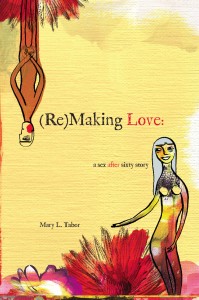In May I had the great pleasure to guest teach Joanne Glenn’s class on “Writing Memoir” at the Vienna Community Center in Virginia. I was hoping more of her students would contribute to this blog post, but two extraordinary women did. I made this offer to everyone in the class: Do this writing experiment (I guided them through it as a guided imagery free write—and they did love it!) and I will post on my blog 100 words of whatever you write.
The experiment you’ll see in a moment, but first I must tell you about another extraordinary event in my life that occurred simultaneously with Joann’s invitation and my visit. I grew up on Grantley Road in Baltimore. As I say in my memoir
(Re)Making Love,
“I grew up in a Baltimore row house with stairs to the second floor and stairs to the basement and a view from the front door to the back door and the clothes tree outside the door. My childhood house didn’t have hallways or a foyer. There was no place to hide anything or to hide. I could hear the neighbors when they argued and everything that everyone said inside my narrow house was fair game for anyone in the back, the front, up or down the stairs.”

Across the street lived Maxine Kahn, who (or should that be "whom"? Do we care?) you will meet today. I had not seen or heard from her since she moved away when we were both fifteen years old, and we were best, best friends: never-ending hours of Canasta gave proof to our love of cards—I went on to Bridge that nobody seems to play anymore—and to our ability to be with each other. She was my safe harbor when I was a child. Recently for some reason she decided to “google” me, found my website and me, and we’ve been corresponding ever since. And it turns out, that Maxine dabbles in poetry. Well, that’s what she calls it. I guess we’ll see about that.
What I am about to prove to you is that if you want to write a memoir, go home first. Here’s how you do it.
A Happy Home Full of Life
We were the ‘singing family’-- My father and his 8 children.
The scene I remember most is of us getting together to sing. My father sat in his special chair with his favorite violin. My brother, Joe, stood near a table as he didn’t like sitting down to play the violin. My second brother, Thankan, had his flute and the youngest one, Marcel, sat on the floor to play the harmonium. My sisters and I were the vocalists. Oh, did we have fun! All the neighbors knew that we were all home for the holidays.
Achamma,
This piece is very close to being. I struck through only one sentence. The reason is that the reader knows this. You need not state what you have proven through the details.
Now as to those details. They are marvelous, particularly the way Joe gets identified as not wanting to sit. We see where everyone is. I have a sense that it might help to “see” the father’s chair. Here’s why: Take your suitcase, as I like to say, and turn it into a painting. You’ve unpacked. Now look at what you’ve got as if it’s a canvas that you’ve begun. Take your writer’s brush and paint in again and again the details, all the concrete, small observations that make story live. The story is in the details.
But I am happy to publish this on my blog as is. Let me know about the strike through—something I think you should do—or if you want to add anything. I would title the piece simply “Singing,” for the same reason I give you for the strike through, but again this is your choice.
Here is Achamma’s rewrite:
Singing
We were the ‘singing family’-- My father and his 8 children.
We were a unique family in the village and we did the singing as a family. Girls singing in church was very unusual during those days. My father was the choir master and one of the very few in the village who could play a musical instrument. One by one, as we grew up, we all joined the choir. Singing in the church got us into singing for any function that took place in the village. So the word ‘family’ is special to me.
The scene I remember most is of us getting together to sing. My father sat in his special chair with his favorite violin. My brother, Joe, stood near a table as he didn’t like sitting down to play the violin. My second brother, Thankan, had his flute and the youngest one, Marcel, sat on the floor to play the harmonium. My sisters and I were the vocalists
All the neighbors knew that we were all home for the holidays.
And here is how Evelyn Caballero did it:
Married to Market and Cooking
Mommy cooked every meal and always served Daddy first at the family table. She went to market weekly buying fresh fruit, vegetables and fish for his favorite dishes. She continued this habit after we left home, even when he at 89 became terminally ill.
No one knew he would leave us that late afternoon in May of 2010. Mommy served him breakfast. That evening she repeatedly said , “I greeted him then I went to the kitchen to cook his breakfast…”
She never went to market and rarely cooked after Daddy died. Daddy and Mommy were married 65 years.
Here is Evelyn’s piece with my edits:
Mommy cooked every meal and always served Daddy first at the family table. They were married 65 years.[I moved this up because it is basic info the reader needs quickly so that she knows how long Mommy did this.] She went to market weekly buying fresh fruit, vegetables and fish for his favorite dishes. She continued this habit after we left home, even when he at 89 became terminally ill.
No one knew he would leave us that late afternoon in May of 2010. Mommy served him breakfast. That evening she repeatedly said , “I greeted him then I went to the kitchen to cook his breakfast… .”
After he died, she stopped going to market. She didn’t cook. cooked after Daddy died. Daddy and Mommy were married 65 years.
And here is Maxine Kahn’s poem. She didn’t do the free write, but she did go home to find her poem:
Summer Nights in Baltimore
I remember summer nights in Baltimore
We were ten back then in 1956
Boys in crew-cuts
And girls in swinging pony tails and short summer dos
From early light til dark
We ran up and down hot city streets and sidewalks
Escaping the heat on cool, wet summer lawns
We jumped and twirled
In and out of rotating sprinklers
And small round plastic pools
That dotted backyard lawns
Innocent and joyous
We lept about in shorts and skimpy shirts
Arms and legs poking out, lean
Brown as chestnuts
From long hours spent under the sun
We ran in packs then, into the twilight – til dark
Our feet snug in nifty blue Keds, and white PF Flyers
Carrying empty mayonnaise jars
With holes punched into their lids
Air vents for our future captives – lightning bugs
Like shooting stars – elusive
Speeding by in the night sky
Lightning bugs -
Our nighttime summer companions – our prey
Flashing on and off like Christmas lights
Disappearing and reappearing in a blink
As if playing hide-and-seek with us
Trying to outwit us
But for the glory of the hunt
We persist
Our voices rising into the night sky
One after another, claiming victory in the chase
“I see one, over there….no, there its goes…it’s over there….I got it”
“And there’s another…..I got that one.”
Shouts my next-door neighbor, Ronnie Aaronson
As he quickly snatches a set of lit wings
Out of the dark, and into a small fist
Pulsing with warm yellow light
And carefully transfers each glowing catch
Into a jar
Then another and another, again and again
Two, three, four …
All blinking on and off
A light show behind glass walls
We are mesmerized by the sight of it
These flaming jeweled wings
Warming and lighting their temporary glass homes
We come together to compare, to see
Who has the best catch of the night
We huddle closer
To view the accumulated light from our jars
Now reflected onto our faces
Distant voices edge into our circle of excitement
It is our parents, perched above the street
Observing from railed cement porches
Connected to
The long stretch of red brick row houses
That lined our beloved Grantley Road
Our parents,
Sitting and rocking back and forth
On squeaky metal gliders
Sipping cool summer drinks
Calling our names out
Across lawns and into the streets
Waving us home for the night
We resist the calls
Wanting to stay in our huddle of friendship
But, as darkness falls, we give up our night chase
And head home
Our precious cargo in hand, lighting the way
More on Maxine and home and memoir in an upcoming post.
 I don’t tweet about my memoir (Re)Making Love: a sex after sixty story much, though some. I don’t blog about my book much, but some: actually, I blogged the book while I lived it—that’s the first crazy-some-say thing I did before the product development company found me—and that accounts for the banner of a blog that deals not with erotica but with literary thought, interviews and essays on writing and books.
I don’t tweet about my memoir (Re)Making Love: a sex after sixty story much, though some. I don’t blog about my book much, but some: actually, I blogged the book while I lived it—that’s the first crazy-some-say thing I did before the product development company found me—and that accounts for the banner of a blog that deals not with erotica but with literary thought, interviews and essays on writing and books.




















